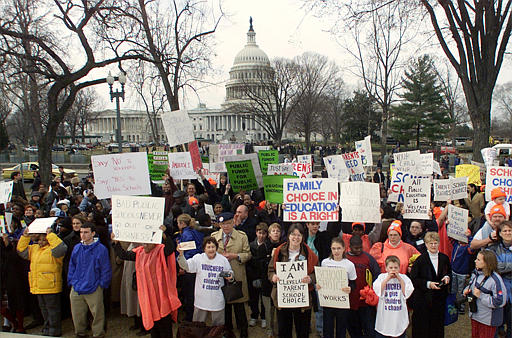In Committee for Public Education and Religious Liberty v. Nyquist, 413 U.S. 756 (1973), the Supreme Court invalidated an attempt by New York state to provide money grants to parochial schools for maintenance and repair of school facilities. The Court also invalidated two other programs that provided tuition reimbursements and tax deductions to parents of children attending such schools.
A federal district court had struck down two of the three programs — upholding only the tax deduction program — but the Supreme Court ruled that all three programs violated the establishment clause by impermissibly advancing religion.
Court said New York private school aid violated establishment clause
In the opinion of the Court, Justice Lewis F. Powell Jr. focused on interpretation of the establishment clause. He chiefly applied the three-part test set out in Lemon v. Kurtzman (1971).
Powell objected to the maintenance and repair provisions on the basis that they made no attempt to restrict payments to the upkeep of buildings devoted to secular purposes and thus had a primary effect of advancing religion. He therefore considered the aid different from that which the Court had previously upheld in Everson v. Board of Education (1947), Board of Education v. Allen (1968), and Tilton v. Richardson (1971).
Powell believed the tuition reimbursement and tax deduction programs were defective because they too had the primary effect of advancing religion. Powell saw little difference between tuition reimbursements and tax deductions. He attempted to distinguish these benefits from those that the Court had recognized in Walz v. Tax Commission (1970), arguing that the exemptions in Walz had more historical warrant and applied to all nonprofit organizations. Although the tax deductions in Nyquist applied to secular schools, they constituted such a small percentage of private schools that it was uncertain whether the legislature would have passed such exemptions with only them in mind.
Powell did not examine the excessive entanglement prong of the Lemon test, but he did warn against the continuing possibility that such aid programs would further “continuing political strife over aid to religion.”
Dissenting opinions would have upheld tuition grants and tax deductions
Chief Justice Warren E. Burger authored a partial dissent, agreeing that the maintenance and repair provisions were unconstitutional but disagreeing that the tuition grants and tax relief provisions were. He argued that they were “indistinguishable in principle, purpose, and effect from the statutes in Everson and Allen” and that “the ‘primary effect’ branch of our three-pronged test was never . . . intended to vary with the number of churches benefited by a statute under which state aid is distributed to private citizens.”
Justice William H. Rehnquist wrote a separate dissent, arguing that the aid programs at issue could not be distinguished from those in Allen, Everson, and Walz.
Justice Byron R. White also authored a dissent, which also applied to the companion cases of Sloan v. Lemon and Crouter v. Lemon. He asserted that prior decisions had entitled parents to send their children to parochial schools and that the laws at issue were a means of preserving this option. Acknowledging that he was “unreconciled to the Court’s decision in Lemon v. Kurtzman,” White nonetheless did not think that its acceptance would require voiding the tuition and tax provisions. He noted that “the test is one of ‘primary’ effect not any effect.”
Subsequent decisions in Mueller v. Allen (1983) and Zelman v. Simmon Harris (2002) have upheld some forms of tax relief and voucher programs that include aid for parents who send their children to parochial schools.
John Vile is professor of political science and dean of the Honors College at Middle Tennessee State University. He is co-editor of the Encyclopedia of the First Amendment. This article was originally published in 2009.

